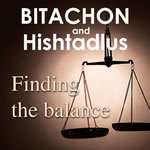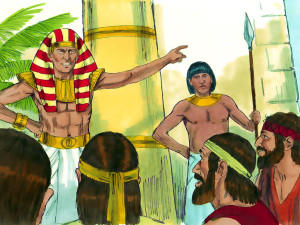Miketz 2015: Hishtadlus (Effort) vs. Faith
by devadmin | December 10, 2015 11:57 am
Hishtadlus (Effort) vs. Faith
Ah lictigin (bright) Chanukah to all…Shoin, here we are in Parshas Miketz and the suspense is building. Though we have all heard the story of Yoisef’s revelation (to his brothers) many times -and what a revelation it was- as we will be reading next shabbis, the drama continues this week as Yoisef will suddenly be released from prison and the RBSO will set in place the events that zicher He had intended all along. Remember the master plan. The emes is that his release was not quite so sudden; it was 12 years later. We will have more to say on this way below; stay tuned, it’s givaldig! Grada, it was two years since he correctly and insightfully interpreted the dreams of the Saar Hamashkim and Saar Ho’oifim (Wine Chamberlain and Chief Baker) and asked the Wine Chamberlain for his help in getting Yoisef released from prison. We will be addressing his request and what a few had to say about why Yoisef may have been punished and had his stay extended by two years shortly, ober, ershtens (firstly)….
This is our sixth time – OMG- around this amazing parsha and in reviewing archives, the Oisvorfer notes that he has covered kimat every major and even minor storyline. Avada if you want to smile and if you weren’t yet an Oisvorfer follower in years 2010-2015, you should avada go to the site www.oisvorfer.com and read previous posts on this parsha. Grada 2010 has temporarily been misplaced. In 2011, we discussed Osnas, she perhaps the eynikel (granddaughter) of Yakov Ovenu and also somehow maybe also the daughter of Mr. and Mrs. Potifera. We also covered, more than once, how Potifar may have become Potifera and how long before Bruce Jenner set some junk aside, if you chap, to become Caitlyn Jenner, the RBSO Himself or through a malach had Potifar’s junk removed because of sexual advances he made..err…we meant to say homosexual advances he made on Yoisef. Was he the first sexual predator? Ver veyst? Qualified to be a rebbe in a yeshiva, certainly he was. In any event, without his rod, Potifar became Potifera. And we know this how? From Rashi of course. In 2012, we discussed Yoisef’s somewhat unusual conditions for the sale of provisions to the hungry Mitzri subjects. Before he would sell them much needed grain, Yoisef insisted that all Mitzrim cut their junk down to size; they were all forced to have themselves circumcised. Why someone needed to be circumcised to eat food, ver veyst? So happens that the Yiddin adopted this custom and this is how it is by us Yiddin ad hayoim hazeh. First the cutting, followed always by an elaborate coalition and more. In 2013 and again in 2014, we reviewed and added a few new givaldige medroshim.
 In our parsha, also in Vayigash (next week), there are at least a few mentions or references to the shemekel (junk). Why, ver veyst? Of course you all recall that Rashi -who else- will tell us that Yoisef, in an attempt -seemingly successful- to convince his brothers that he was/is one of them- will (next week) create the famous game of ‘I’ll show you mine if you show me yours’ and will pull his pants down to reveal his mila (royal junk). Why, ver veyst? Was that the only way to convince them? Ver veyst? Rashi will also trace Osnas (Yoisef’s wife) back to Shechem who using his junk, had his way with her mother Dina. Dina became trugidick (pregnant) from Shechem’s, if you chap, and gave birth to a daughter whom she or they named Osnas. Why do so many Rashi’s and medroshim reference junk and sexual activity, ver veyst? Another medrish will tell us that when the brothers -in this week’s parsha mamish- arrived to mitzrayim to (supposedly) look for Yoisef, they will fan out all over Mitzrayim. That sounds like a decent strategy if emes, ober, the medrish will also tell us that they first checked out the ‘red light districts’ thinking that their brother Yoisef must -with his good looks- be servicing, or is being serviced by the local girls. The bottom line: For reasons that remain mysterious mamish to the Oisvorfer, many a medrish filled in lacunas in the text with mysehs (stories) of sexual activity which may or may not have taken place. Why this approach, ver veyst? Maybe these exegists were geniuses and chapped that unless many of us could visualize and efsher internalize some chapping, that we wouldn’t chap pshat, or, wouldn’t be interested in learning pshat. Again, the bottom line: Chaps sell!
In our parsha, also in Vayigash (next week), there are at least a few mentions or references to the shemekel (junk). Why, ver veyst? Of course you all recall that Rashi -who else- will tell us that Yoisef, in an attempt -seemingly successful- to convince his brothers that he was/is one of them- will (next week) create the famous game of ‘I’ll show you mine if you show me yours’ and will pull his pants down to reveal his mila (royal junk). Why, ver veyst? Was that the only way to convince them? Ver veyst? Rashi will also trace Osnas (Yoisef’s wife) back to Shechem who using his junk, had his way with her mother Dina. Dina became trugidick (pregnant) from Shechem’s, if you chap, and gave birth to a daughter whom she or they named Osnas. Why do so many Rashi’s and medroshim reference junk and sexual activity, ver veyst? Another medrish will tell us that when the brothers -in this week’s parsha mamish- arrived to mitzrayim to (supposedly) look for Yoisef, they will fan out all over Mitzrayim. That sounds like a decent strategy if emes, ober, the medrish will also tell us that they first checked out the ‘red light districts’ thinking that their brother Yoisef must -with his good looks- be servicing, or is being serviced by the local girls. The bottom line: For reasons that remain mysterious mamish to the Oisvorfer, many a medrish filled in lacunas in the text with mysehs (stories) of sexual activity which may or may not have taken place. Why this approach, ver veyst? Maybe these exegists were geniuses and chapped that unless many of us could visualize and efsher internalize some chapping, that we wouldn’t chap pshat, or, wouldn’t be interested in learning pshat. Again, the bottom line: Chaps sell!
Does the medrish mamish suggest that the brothers, the very holy shevotim, the children of Yaakov, the very ones whose names as we said last week, adorn the breastplate of the Koihen godol, windows of many shuls and myriad other religious items, went looking for their brother, not in the local branch of the Yeshiva of Shem and Ever (where others have disappeared to for extended periods of time) but instead went looking for him in brothels thinking that he may be surrounded by local zoinas (whores)? Indeed it does just that. Ober, didn’t we learn that Yaakov gave over all his learning to his favorite son Yoisef? We did! And, didn’t we learn that when they were last together -Yaakov and Yoisef- that they were studying the sugya of ‘egla arufa’? We did. And didn’t the brothers know all this and weren’t they jealous mamish of the special relationship that Yaakov and Yoisef shared? And, weren’t they efsher jealous that Yaakov was learning only with Yoisef? Ober did the brothers suspect that he may be in a yeshiva? Not! Grada the Oisvorfer remains bothered that there are no references in the heylige Torah -not a single one- to any good deeds these holy rollers may have been involved with on a daily basis. Shoin, let’s go veyter and let’s begin with a comment received this week.
Dear heylige Oisvorfer Ruv (shlita): I see that you ended your amazing review of Vayeshev by exonerating Yehuda for his behavior and the brothers for theirs. You came to your senses and realized that it was all the will of the RBSO. Ober (to speak in true oisvorf parlance), you left Reuven hanging. Couldn’t you end on a high note as you so artfully do many weeks by finding something nice to say about Reuven, or at least also include him in the RBSO’s master plan?
I am mamish a real admirer of your review and while I am a relatively new chosid and avid reader, I love your style and content. You teach with humor, ask and answer many good questions our yeshivas didn’t. Recently I have been hitting the link to your archives and love each and every parsha post. Your writing has only gotten better and your content, though a shtikel racy at times, is indeed on the mark. You are correct that nearly all of your comments were previously written by other well established and oft quoted commentators. Your comments should be published. Your influence is far reaching and may the RBSO bless you and your family for all your teachings.
A freylichin and lichtigen Chanukah
Yankel Sternlicht
Shoin: The Oisvorfer is avada flattered by the comments in this givaldige letter and begins this week with a medrish (where else) which taka exonerated Reuvain. Said that medrish (whose name cannot be recalled today) azoy: Reuvain also did tshuva. He did? When and where? Says the medrish so gishmak azoy? Reuvain was either present or heard that Yehudah had just come out with the big news that it was he who had relations roadside and impregnated Tamar. And when Reuvain heard that Yehudah proclaimed the words ‘Tzodko Mimehne (she is more correct than am I), Reuvain immediately owned up to his own sin of acting improperly with Bilah, his stepmother, and also repented. Did he move the bed back, ver veyst? Did he admit to mounting it, ver vest? Moreover, in this week’s parsha, we will come across a few pisukim where the holy brothers finally admit their involvement in the plot that resulted in the sale of their brother Yoisef into slavery. Says the heylige Toirah (Bereishis 42:21-22) azoy: “Then they said to one another, indeed we are guilty concerning our brother inasmuch as we saw his heartfelt anguish when he pleaded with us and we paid no heed. That is why this distress has come over us.” And one more possik…”Reuvain retorted to them as follows. Did I not say to you in effect “Do not sin against that boy,” but you would not listen and his blood as we see, it is being avenged.” Shoin, there you have it. Veyst zich ois (seemingly), Reuvain both did tshuva for the Bilah incident and now also tells his brothers that they acted against his wishes. Shoin, he’s innocent but still avada guilty of the conspiracy and cover-up.
Grada this exchange where the brothers attribute their current troubles -Yoisef will accuse them of being spies- to their treatment of Yoisef, is a topic hotly debated. And the question is azoy: May one mamish decide for him or herself that any stress he/she might be suffering, be it in the form of an illness, business downturn, marriage issues, or any other for that matter, is directly attributable to a particular sin he/she may have committed? Are we empowered to connect the dots? Grada the Oisvorfer has debated this topic with many. The debate continues daily. And while a few say it’s taka so that we may mamish play the game of sechar v’oinesh (reward and punishment) and may taka attribute certain punishments to specific sins- maybe they are wrong. Efsher, one is being punished for other sins? Maybe the punishment was long overdue but is only being meted out now and is not at all associated with the sin one believes is the underlying cause of his woes? Can we trace cancer to a particular sin? Grada most of us have so many sins, it’s kimat impossible to connect them to any particular punishment. Ober the shevotim seemed to have believed that there was mamish a direct cause and effect. May we lay blame and specify what sin gets what punishment? Who appointed us and them to judge and to chap the RBSO’s ways? Ver veyst? Ober, says the Rambam azoy: One cannot decide for himself why any given disaster occurred, except for those when Chazal (our wise sages) explicitly draw such an association. And says the Rambam (beginning of Hilchos Ta’aniyos) azoy: Times of crisis must avada trigger an intense process of soul-searching and tshuva (repentance). We need to be mifashfashe bi’maisof (self introspection) as we are to do yearly when choidesh Elul and the Yomim Noiroim (High Holy Days) come around and that’s taka what the Rebbe taught me when he beat me with his shtekin, both of them, if you chap. When confronted by difficult situations or tragedy- chas v’sholom (heaven forbid), a person, a community or a nation, must taka search for areas requiring improvement. One may not however definitively conclude or make a correlation between a specific crisis and a specific sin. One should reflect on his overall character and avada resolve to correct flaws. Shoin: again the brothers were guilty.
 Shoin, let’s take a look at what has the Oisvorfer hot under the collar this week and for that we shall begin with the very first words of this week’s parsha which state “And it was at the end of two years…”. What two years? We are taught exactly two years had passed since Yoisef correctly deciphered the dream of the Saar Hamashkim and predicted his return to Paroy’s inner cabinet. He would again be in charge of spirits. Nu, to chap what really took place and how these two years played a role in how many a medrish tied them to a sin Yoisef may have committed, we need to turn back the clock to last week’s parsha of Vayeshev and look at two pisukim (verses). The very last verse of the parsha will tell us that the Saar Hamashkim did not remember Yoisef, and “he forgot him.” Note the double language. An earlier posik (Bereishis 40:14) will tell us what took place before the forgetting. Two years earlier: Yoisef noted the Saar Hamashkim’s satisfaction with Yoisef’s interpretation and prediction. In the next posik, Yoisef took the opportunity to ask the Saar to favorably mention his name to Paroy in the hope that such mention would garner him a release from prison. Sounds plausible and logical; most would do the same. Rashi, on that very posik (last week) will tell us that for this grave sin -asking a mere mortal for help- the RBSO punished Yoisef and added two years to his already lengthy ten year sentence for a crime he did not commit. In plain English: Yoisef’s efforts to save himself, seemingly resulted in an additional sentence of two years. Does this make sense?
Shoin, let’s take a look at what has the Oisvorfer hot under the collar this week and for that we shall begin with the very first words of this week’s parsha which state “And it was at the end of two years…”. What two years? We are taught exactly two years had passed since Yoisef correctly deciphered the dream of the Saar Hamashkim and predicted his return to Paroy’s inner cabinet. He would again be in charge of spirits. Nu, to chap what really took place and how these two years played a role in how many a medrish tied them to a sin Yoisef may have committed, we need to turn back the clock to last week’s parsha of Vayeshev and look at two pisukim (verses). The very last verse of the parsha will tell us that the Saar Hamashkim did not remember Yoisef, and “he forgot him.” Note the double language. An earlier posik (Bereishis 40:14) will tell us what took place before the forgetting. Two years earlier: Yoisef noted the Saar Hamashkim’s satisfaction with Yoisef’s interpretation and prediction. In the next posik, Yoisef took the opportunity to ask the Saar to favorably mention his name to Paroy in the hope that such mention would garner him a release from prison. Sounds plausible and logical; most would do the same. Rashi, on that very posik (last week) will tell us that for this grave sin -asking a mere mortal for help- the RBSO punished Yoisef and added two years to his already lengthy ten year sentence for a crime he did not commit. In plain English: Yoisef’s efforts to save himself, seemingly resulted in an additional sentence of two years. Does this make sense?
Though we have read this Rashi many times and though this story is mamish well known to anyone that was enrolled in yeshiva, one can taka to be left wondering what Yoisef did wrong here? Is asking someone for a favor so giferlich a sin? Were you in prison and got word that someone could help you, would you not reach out? How many emissaries did the Jewish people send over the centuries with hefty bribes in attempts -some even successful- to free famous rebbes? Ober, as mentioned, many a medrish and other commentators chime in with different approaches as to what Yoisef may have done wrong and why, according to them, he was to suffer two additional years of imprisonment. For the most part, they will tell us that Yoisef momentarily lost his faith; he did not have enough b’tochoin (faith) in the RBSO to free him from prison. Ober is that correct?
 Did he not sit there patiently for ten years waiting for the RBSO to come get him? Let’s recall: He was innocent. Is asking someone for honorable mention after ten years mamish a sin? Do we not on a daily basis ask others for help? Throughout our glorious history, have we not heard of people running all over the world seeking help from anyone they perceive as being in a position to offer such help? Do we not on a regular basis, if facing an illness in the family, seek help from doctors? And do we not regularly run to rebbes seeking their blessing? And do we not also run to mikubolim (kabbalists) and shtupp them with money (idiots that we are) seeking their intervention when a crisis hits? Avada we do! And do we not when any crisis hits, be it business, personal, legal and any other matter, run to the appropriate intermediaries seeking their help? We do! Again we ask: What did Yoisef do that was so giferlich? Did he ask the Saar to sneak in a cell phone so that he could call his father who was mistama worried sick over his fate? He did not; in fact, he never called or wrote home, ober that for another time. Grada, one can argue and it’s efsher also logical that Yoisef sat another two years davka because he didn’t ask the Saar to contact his family and tell them he’s alive. So happens that one medrish will tell us that Yoisef did not contact them because he realized that his journey was being controlled from above. It was all the RBSO’s doing. Oib azoy (if so), maybe he should taka not have asked the Mitzri for help. And therein may taka lie the answer. Maybe he had a momentary lapse of b’tochoin.
Did he not sit there patiently for ten years waiting for the RBSO to come get him? Let’s recall: He was innocent. Is asking someone for honorable mention after ten years mamish a sin? Do we not on a daily basis ask others for help? Throughout our glorious history, have we not heard of people running all over the world seeking help from anyone they perceive as being in a position to offer such help? Do we not on a regular basis, if facing an illness in the family, seek help from doctors? And do we not regularly run to rebbes seeking their blessing? And do we not also run to mikubolim (kabbalists) and shtupp them with money (idiots that we are) seeking their intervention when a crisis hits? Avada we do! And do we not when any crisis hits, be it business, personal, legal and any other matter, run to the appropriate intermediaries seeking their help? We do! Again we ask: What did Yoisef do that was so giferlich? Did he ask the Saar to sneak in a cell phone so that he could call his father who was mistama worried sick over his fate? He did not; in fact, he never called or wrote home, ober that for another time. Grada, one can argue and it’s efsher also logical that Yoisef sat another two years davka because he didn’t ask the Saar to contact his family and tell them he’s alive. So happens that one medrish will tell us that Yoisef did not contact them because he realized that his journey was being controlled from above. It was all the RBSO’s doing. Oib azoy (if so), maybe he should taka not have asked the Mitzri for help. And therein may taka lie the answer. Maybe he had a momentary lapse of b’tochoin.
Kimat universally, Yoisef is charged and found guilty by the medrish for having lost his b’tochoin and relied instead on his own hishtadlus (efforts). Are we to sit idly by and rely only on the RBSO for help? Is there not a role for our own efforts? What is that role? Moreover, are we not taught that a person should not rely on miracles, and must act on his own? We are! Didn’t Yaakov Ovenu, when preparing to meet his brother Eisav after 34 years, employ a trinary strategy which included gifts (read: bribery), war preparation and davening to the RBSO? He did! Ober poor Yoisef is lambasted for asking the Saar Hamashkim but one time for some help? What’s taka pshat here and when is personal effort called for vs. having complete and absolute faith that the RBSO will make everything good?
A classic answer given is that hishtadlus (own effort) is to be used only to supplement the b’tochoin that one is supposed to have. Ober how much and what is the formula? Is it 90/10 in favor of b’tochoin? Is 50/50 the number? Or efsher two parts b’tochoin to one part emunah (belief and faith)? How are we to taka know? Taka excellent questions.
 Let’s learn. Said the Chazoin Ish (Emunah ub’tochoin) azoy: Yoisef’s particular circumstances did not demand his reliance on the help of the Saar Hamashkim. He should have known that the Mitzrim (Egyptians) were a bad bunch and though he taka did one or two favors, he should not have expected for the Saar to repay the favor. And because he should have known that, his asking for help was but an act of desperation and not considered valid hishtadlus. Ober, asks the Oisvorfer azoy: Wasn’t it the Saar Hamashkim that ultimately, albeit, two years later, did mention Yoisef’s name to Paroy? And wasn’t it directly through his effort that Yoisef was soon thereafter (almost immediately) freed? Yes and yes! What then can we chap from those answers? We learn that in this case, Yoisef’s hishtadlus in asking for help, worked! Let’s go veyter. Some will argue that Yoisef’s salvation came about two years later and only after much davening and yet more suffering, ober is that emes?
Let’s learn. Said the Chazoin Ish (Emunah ub’tochoin) azoy: Yoisef’s particular circumstances did not demand his reliance on the help of the Saar Hamashkim. He should have known that the Mitzrim (Egyptians) were a bad bunch and though he taka did one or two favors, he should not have expected for the Saar to repay the favor. And because he should have known that, his asking for help was but an act of desperation and not considered valid hishtadlus. Ober, asks the Oisvorfer azoy: Wasn’t it the Saar Hamashkim that ultimately, albeit, two years later, did mention Yoisef’s name to Paroy? And wasn’t it directly through his effort that Yoisef was soon thereafter (almost immediately) freed? Yes and yes! What then can we chap from those answers? We learn that in this case, Yoisef’s hishtadlus in asking for help, worked! Let’s go veyter. Some will argue that Yoisef’s salvation came about two years later and only after much davening and yet more suffering, ober is that emes?
Grada the Oisvorfer came across a givaldige Beis Halevi who said so gishmak azoy: There is a formula for hishtadlus vs. b’tochoin; they are not mutually exclusive, and it depends wholly on the individual person. For most people, asking for help and putting in every effort to find help -in any given crisis- is quite ok. Why? Because most people are lacking in b’tochoin from the get go. Ober for Yoisef Hatzadik, who was on a higher spiritual level, his efforts were not kosher and demonstrated a lack of faith. And taka because he was such a good person and a person of extreme faith, that his asking, his efforts, were sinful and resulted in his punishment.
What’s taka pshat here and what can we learn from this myseh? Seemingly for most Oisvorfer readers and followers, the lessons from the Yoisef-Saar Hamashkim story are givaldig. The RBSO chaps that you are lacking in your overall faith (emunah and b’tochoin). Therefore He expects little from you and taka you don’t disappoint. Accordingly, you are free to move about the cabin or anyplace else seeking the help of anyone that will make you feel better about your circumstances. Ober, were you to be on a higher spiritual plane, a person like Yoisef who left his shirt behind though seduced daily by Mrs. Potifar, and were you a person that had healthy doses of emuna and b’tochoin, you too might be punished for seeking outside help from those offering comforting words and other remedies. You might be punished for going to rebbes and soothsayers and other charlatans whose bagmen might convince you to spend many thousands of dollars when you are most vulnerable. Luckily, you are not Yoisef; when you leave your shirt behind, the pants typically follow, if you chap. You will likely not be judged by his yardstick, you will be judged by your stick, if you chap. A person like yourself could and should seemingly also seek the help of others.
 Let’s chazir (review): It does appear that each person has his/her own level of b’tchoin, and depending on that individual level, one may add some hishtadlus to the mix. How much? Again, it depends on your level of b’tochoin. Seemingly the more b’tochoin one has, the less hishtadlus one needs and is allowed to expend. On the other hand, even people with absolute faith, with healthy dose of b’tochoin, still may be required to put some effort of their own into the mix. The bottom line: there is no -one size fits all- magic formula. Instead, it’s a blend customized to each person’s spiritual level. Avada this is givaldige news for the rebbe and mikubil industry who prey mostly on those suffering from various life issues, and are most vulnerable to placing false hope in these people.
Let’s chazir (review): It does appear that each person has his/her own level of b’tchoin, and depending on that individual level, one may add some hishtadlus to the mix. How much? Again, it depends on your level of b’tochoin. Seemingly the more b’tochoin one has, the less hishtadlus one needs and is allowed to expend. On the other hand, even people with absolute faith, with healthy dose of b’tochoin, still may be required to put some effort of their own into the mix. The bottom line: there is no -one size fits all- magic formula. Instead, it’s a blend customized to each person’s spiritual level. Avada this is givaldige news for the rebbe and mikubil industry who prey mostly on those suffering from various life issues, and are most vulnerable to placing false hope in these people.
And we close with this thought: a few months back, a chaverta (female friend) shared a Devar Torah, in which she wrote azoy: “The Ohr Hachaim tells us that the RBSO sometimes send us to a place of profound darkness in order to explore life’s true purpose.” Seemingly, that was Yoisef’s mission. He was being held in a dark dungeon. By the time, twelve years later, he was done exploring, he was ready for his life’s mission. Maybe he needed those extra two years to finish his studies. When called upon to decipher Paroy’s dreams, he was pulled out of the ‘boir’, (pit or dungeon) and was ready. The rest is history.
A gittin Shabbis and a freylichin Shabbis Chanukah.
The Oisvorfer Ruv
Yitz Grossman
Source URL: https://oisvorfer.com/miketz-2015-hishtadlus-effort-vs-faith/
